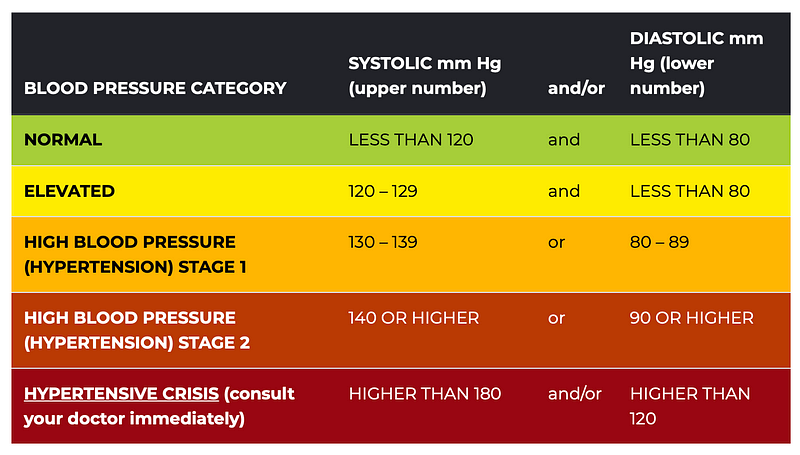Essential Strategies for Lowering Blood Pressure Naturally
Written on
Understanding Hypertension
Approximately 50% of adults in the United States struggle with high blood pressure, commonly referred to as hypertension. This condition is a significant risk factor for heart disease and stroke, even more so than smoking or high cholesterol levels.
Blood pressure readings under 120/80 mm Hg are considered normal. The first number, known as systolic pressure, indicates the force in the arteries when the heart beats. The second number, diastolic pressure, measures the pressure when the heart is at rest before the next beat.
To assess your blood pressure status, refer to this chart from the American Heart Association. If your readings are higher than normal, the following tips may assist you in managing your blood pressure effectively.

Please note, while I am a nutritionist, I am not a medical professional. The information provided here is not intended for diagnosing or treating any health condition. Always consult with a healthcare provider for health-related advice.
Recommended Tips to Lower Blood Pressure
- Increase Plant-Based Foods and Reduce Red Meat Intake
Research indicates that individuals following vegetarian diets have systolic blood pressure readings approximately 7 mm Hg lower than those consuming meat. A study published in the Journal of Hypertension reinforces that simply increasing plant consumption while decreasing meat intake can yield significant benefits.
The DASH (Dietary Approaches to Stop Hypertension) diet is particularly effective, emphasizing fruits, vegetables, whole grains, nuts, and seeds, along with moderate amounts of white meat and low-fat dairy. This diet limits added sugars, red meats, saturated fats, and sodium.
One reason plant-based diets are effective is the high nitrate content in vegetables, which can convert to nitric oxide, relaxing blood vessels and lowering blood pressure. Conversely, red meat can foster harmful gut bacteria that produce trimethylamine-N-oxide (TMAO), a compound linked to heart disease.
- Incorporate Beets or Beet Juice into Your Diet
Consuming foods high in nitrates, such as beets, can significantly lower both systolic and diastolic blood pressure. However, the conversion of dietary nitrates to nitrites (which then convert to nitric oxide) involves oral bacteria, leading to the next important tip.
- Avoid Antiseptic Mouthwash
The mouth is home to numerous beneficial bacteria that aid in the conversion of nitrates to nitrites. Unfortunately, antiseptic mouthwashes can kill these helpful microbes. Research suggests that these anti-bacterial products can increase hypertension risk by diminishing the bacteria necessary for nitrate conversion.
Instead, consider using herbal dental products and practice tongue-brushing, which may enhance the population of beneficial bacteria.
- Hum or Sing with Your Mouth Closed
A study found that humming can increase nasal nitric oxide levels significantly compared to quiet breathing. This increase is believed to help regulate pulmonary blood pressure and may prevent hypertension.
- Enjoy Dark Chocolate
Research examining multiple studies with over 1,100 participants found that dark chocolate containing 50-70% cocoa can lower blood pressure, especially in individuals already experiencing hypertension. This effect is likely due to enhanced nitric oxide production.
- Consume Low-Fat Dairy Products
Studies have shown that those consuming two or more servings of low-fat dairy daily have a reduced likelihood of developing high blood pressure.
- Incorporate Olive Oil into Your Diet
Olive oil has been shown to reduce blood pressure, likely due to its high oleic acid and polyphenol content. Daily consumption of 1/3 to 2 ounces of olive oil can lead to lower systolic blood pressure.
The first video titled "10 ways to LOWER your Blood Pressure (Science-backed)" explores various scientifically supported methods to manage hypertension.
The second video, "Natural Ways To Lower Blood Pressure," offers additional insights into effective lifestyle changes for lowering blood pressure naturally.
I trust these recommendations will be beneficial. For more articles on nutrition and health, feel free to follow my work.